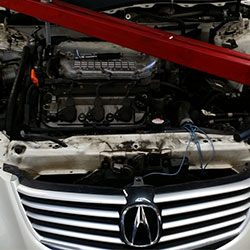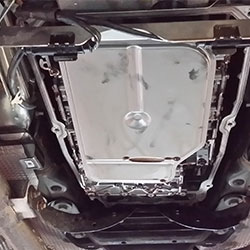Posted on 9/15/2014

We had a 2005 Acura RL in with a warning on the dashboard indicating low oil. The oil level was checked and found to be at proper level. We decided to change the oil first before beginning tear down to check the condition of the oil and check for any possible sludge buildup. The oil looked good. Manually checked oil pressure and it was intermittently testing low. The oil pump was not pumping sufficient amount of oil to the top end of the engine and needed to be replaced. Quite a timely process, but needed to be done before any damage is done to the engine. It was good we got to the problem now as after replacement of the oil pump, the warning is gone, the engine is running like a champ and the customer does not need to replace the motor! ... read more
Posted on 9/3/2014

BMW’s maintenance schedule recommends that the spark plugs on this BMW M6 are to be changed every 37,000 miles. It is a pretty straight forward procedure. Remove the intake ducts, loosen the intake box, remove any breather hoses in the way, pull out ignition coils and that should give you enough access to get the plugs out and in. We will be replacing the plugs with the factory recommended NGK Laser Platinum plugs. NGK is a name that most people should know if they know a thing or two about cars. We are surprised to find NGK in this particular setup as BMW usually defaults to BOSCH plugs. Apparently they just didn’t make the cut for this year and model. Most standard 3 and 5 series BMWs have a factory scheduled spark plug change around 100,000 miles, but since this is a high output / high performance V10, it is better safe than sorry to change these on or before the recommended scheduled mileage. ... read more
Posted on 6/12/2014

Most newer vehicles with timing chains do not need the chain serviced or replaced unless the engine has been improperly maintained. This Nissan 240SX has over 300,000 miles and the chain is beginning to rattle and make noise. Over time, the tensioner has become worn and the chain has stretched slightly. We will be pulling the timing cover off to replace the chain, tensioner, chain gears and front oil seals. The customer came in stating there was an odd noise upon vehicle startup as if the engine was low or out of oil that quickly went away. We pulled the oil pan down to get a better look at the oil pickup tube and the lower part of the timing chain. We were able to physically see extra slack in the chain with the pan off. The pan and pickup tube were cleaned before reassembly to ensure no particles are obstructing the flow of oil. ... read more
Posted on 6/11/2014

Customers are often mislead as to when the transmission fluid should be changed on their Mercedes Benz. Rumour going around says that it is a “lifetime” fluid. As professionals, we know that nothing lasts a “lifetime”. Fluid in MOST Mercedes Benz should be changed by 100,000 miles. Newer models 2006 – Present have changed the maintenance interval for the transmission fluid. Mercedes is now scheduling to have the fluid changed around an average of 30,000 miles. We aren’t sure what prompted this change, but it could be due to the fact that consumers were mislead and felt that the transmission never needed service which leads to mechanical breakdowns and expensive transmission repairs. The transmission pan gasket was leaking on this 2005 Mercedes Benz S500 so we needed to remove it, scrape the old gasket off, replace the filter while we were in there, re seal and put it all back together. Low fluid causes the transmission to shift hard or may even cause it not to shift at a ... read more
Posted on 5/30/2014

Here we have a 2005 Volvo S40. The vehicle was towed in and not running. Found low compression on cylinder 5 and had suspect of a possible bent or burnt valve. Upon checking the timing, we noticed the belt was falling apart and had skipped a couple teeth. We needed to install a new belt and get the engine to the proper timing to verify cylinder number 5. After the new belt was installed, the compression on cylinder number 5 was restored and luckily for the customer, we do not need to pull the cylinder head to replace valves. The belt had been deteriorating due to oil leaking onto it from the camshaft and crankshaft oil seals. The oil had cause pre mature wear on the timing belt tensioner. We will be replacing the belt, tensioner, idler rollers, camshaft/crankshaft oil seals as well as the VVT cam sprocket to get the vehicle back in running condition and preventative maintenance to ensure this problem does not happen again! Passenger side of engine seen through fende ... read more